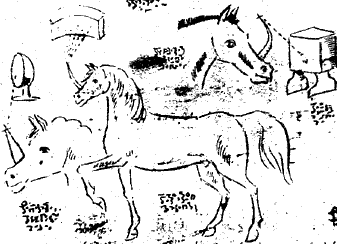(According to Adojuhr, XI century)
| Diferent
species of unicorn and how their horn is used in the making of magical boxes (According to Adojuhr, XI century) |
| Press any of the unicorns for more information on them | ||||||
 The royal unicorn |
 The unicorn from the south |
 The unicorn from Bactur |
 The blue unicorn |
 The German Unicorn |
 The English unicorn |
|
| One hundred years before Adojuhr built his magical boxes, an illustrious Arab, the great Avicena, had taken up the Aristotelian concepts to write some treatises. Avicena was not only a philospher but also a doctor. His observations on life and on human behaviour in general, were totally different from what was accepted in those days in centers of Western culture. |
 |
|
Avicena sensed that the "camera obscura" that Aristotle describes, could be of considerable use if applied to his science and this he makes evident in one of his writings. However, Avicena does not explain how to use it. The Middle Ages, with its fierce obsession of attacking anything that represented a step forward in the explanation of natural phenomena, transformed the world into a center of religious fanatism. For this reason, it is not surprising that Avicena's theories were banned by Popes and European kings, but nevertheless these theories found some followers. In 1040, the young Parisian student Jean de Fantoure was condemned to die at the stake for having dared to refute his teacher in a lecture, using Avicena's arguments. In the same year, in Seville, Adojuhr tenaciously devoted himself to the development of his magical boxes. The fact that a practitioner of the Aristotelian ideas disseminated by Avicenca should have emerged in one of the centers of obscurantism, and that these ideas transcended frontiers until they reached the Arab territories in Spain, provoked a reaction in Adojuhr which inspired one of his notes: |
|
"Just as in France, the young Fantoure has been burnt alive for believing in the theories that we disseminate, I live with the fear of being punished for capturing human forms and images which, ironically, can be represented in the West." The fears of Adojuhr were not groundless. In 1067 he was executed in Seville, under the orders of Abbad III, accused of being a great infidel. After Adojuhr, there is no information on the practice of the "art of capturing images". In the XII century, another Hispanic Arab, Averroes, inventor of a whole philosophy also based on Aristotle's principles, and also attacked by kings and Popes, alludes in passing to the camera obscura in one of his books: "The perpetuation of life through the work of a black box, is not a diabolic act, but a natural one, stipulated by Allah." |